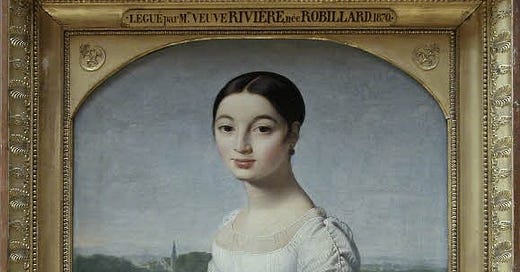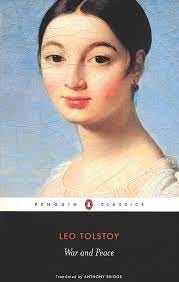Who was Mademoiselle Caroline Riviere?
Reading from the Penguin Classics edition of War and Peace, translated by Anthony Briggs, for the third time might seem constrictive when I know so many hold others in high esteem. Pure nostalgia motivates me to remain with a copy whose front cover alone has all of the justifiable allure that further unravels as each page is turned. Every single word leaves an imprint in the same way this cover does.
The young woman who stares out at you is part of a larger portrait painted by the French artist Jean Auguste Dominique Ingres, in 1806: a year after the novel begins. A French connection is embodied in the first chapter where the Russian nobility converse in the language and some allude to the fact that Tolstoy used this as a deliberate literary device in which the superficiality of the Russian nobility in contrast to later in the novel where the Russian language embodies truth and sincerity.
This code-switching occurs in the first chapter between Anna Pavlovna Scherer and Prince Vasily Kuragin but we do see earlier French influences in Russian literature with the works of Pushkin who was educated in the language and whose family adopted a French culture. Whilst Pushkin immersed himself in the French language, I do believe that Tolstoy consciously included it to not only make an accurate representation of the culture existing in St. Petersburg in the early 19th century but to subtly emphasise possible deception and fakery lurking in the shadows.
Ingres was quoted as saying that Mademoiselle Caroline Riviere was “ravishing”. As a young painter in his twenties, Ingres became increasingly enthralled by her elegance.
Dressed in the fashion of the day, she stares out at you with a variety of different emotions which I find conflict with one another: awkwardness, strength, feminity, inquisitiveness, curiosity and an overwhelming sense of purpose. I truly believe, having read this novel, that there can be no better image to encapsulate the true meaning of humanity which is, after all, what makes this novel so astounding.
I am eternally captivated by this image. Sadly, a year after this painting was completed Caroline passed away but her legacy, certainly from my perspective will live on always.
Chapter One Rambles
The clock struck midnight and with it flowed utter elation at the moment I have been waiting for since signing up for Simon’s year-long read of War and Peace.
Oh, to be a fly on the wall. Tolstoy whisks us immediately away to the hubbub of a St. Petersburg high-society soiree, and the focus is on two immediately brilliant characters: Anna and Vasily. I always feel like I am viewing this scene cinematically. Whilst we do not yet know too much about the people around them, although a couple of name drops are shared, I have always formed my own image of grandeur: space, dimly speckled lighting, glistening jewels catching sparkles in one’s eyes, chairs being shuffled, glasses being clinked, low whispers, warm rapturous hellos and silk streaking across the hard-polished floors.
Anna, our host, is our initial commentator on the political fractions occurring outside the jewelled cacoon and our disinterested Vasily provides comical value in his dry humour and false sincerity.
There are layers upon layers of hidden meaning and opportunities to dissect what little we know of the characters we meet in this short but fruitful chapter:
On Anna:
‘The discreet smile that never left her face, though it clashed with her faded looks, gave her the appearance of a spoilt child with a charming defect that she was well aware of..’
There is so much to unpick in just one sentence that I am continually taken aback by Tolstoy’s ability to shape characters that feel so true to life. Instead of glossing over Anna’s descriptions, I contemplate her life before, even as a child, and her current mindset in the present.
Then, there’s Vasily,
‘His voice remained steady, and his tone, for all its courtesy and sympathy, implied indifference and even gentle mockery.’
And:
‘…with the freedom, familiarity and sheer style that were his hallmark, he took hold of the maid of honour’s hand, kissed it and gave it a little shake, easing back into his armchair and looking away from her.’
Vasily is a man at ease amongst high society but equally, there is an uncomfortableness exuding from him. He is ever so slightly distracted by something. Whilst I initially felt this was due to boredom (I think perhaps he is bored with the superficial conversation/gossip), there is weighing down from somewhere, perhaps lying in his role as a parent to troublesome children and….something else.
The drawing-room of Anna Pavlovna begins to fill up and I cannot wait to meet more of the guests tomorrow morning.
Love and joy to you all!








Love your annotations and so true about how Tolstoy brings out these character. They feel so real so true in the modern context. We may not have aristocrats anymore but human nature the quirks the personalities are still the same
Thank you for sharing this.